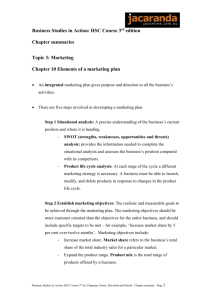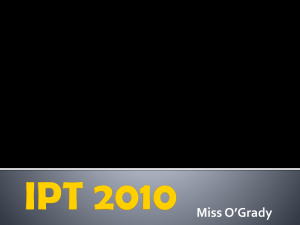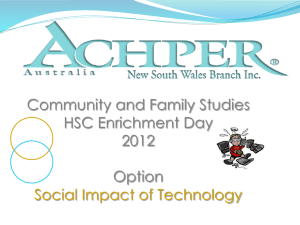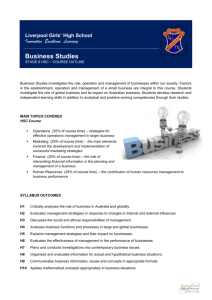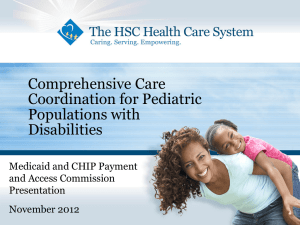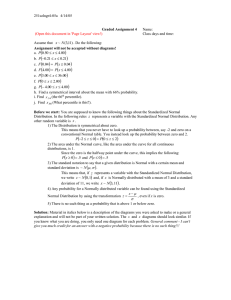The SORRs project - The Open University
advertisement
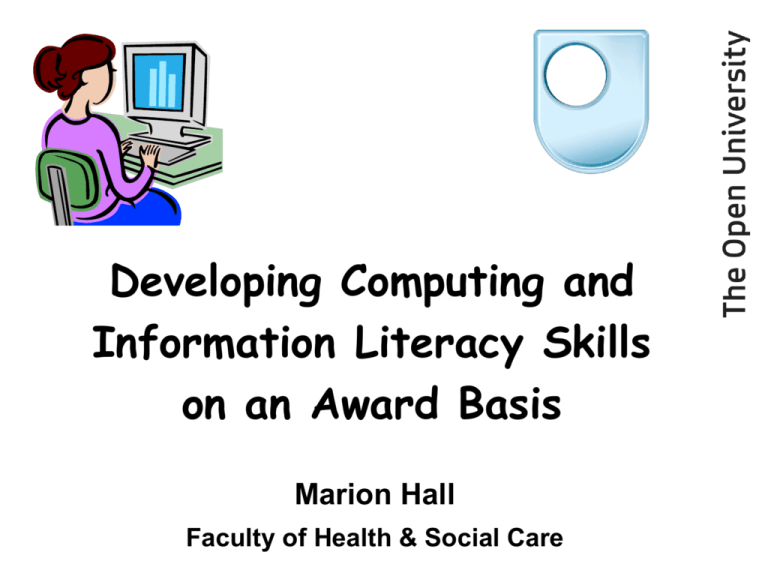
Developing Computing and Information Literacy Skills on an Award Basis Marion Hall Faculty of Health & Social Care Aim Integrate computing (ICT) and information literacy (IL) skills into HSC awards such that: • • • • Skills are taught in the context of the course There is minimal repetition between courses Students progress from L1 → L2 → L3 Students can demonstrate acquisition of specific skills by the end of the award Why? HSC awards need to deliver ICT/IL skills: • To support academic requirements of course • To meet professional and QAA standards • Because employers – and students – want them Background • Award-based skills development in place in ‘professional’ programmes (Social Work/Nursing) – external requirements for award • General Social Care Council – ECDL • NHS – Knowledge + Skills Framework – more straightforward to implement • relatively fixed progression through courses • limited choice of courses • Now developing strategy for award-based skills teaching in HSC programme Progress • K101 (part of all HSC awards) – remade 2008 - now teaches basic ICT/IL skills • Skills Working Group – devised strategy for skills development – identified ICT/IL skills sets for L2+L3 (see handout) – working with CTs to implement L2 strategy • HSC Resource Bank (HSCRB) – online repository of shared resources – generic skills activities – see http://learn.open.ac.uk/site/HSCRB Strategy • Build on skills developed at previous level • Use HSCRB skills activities – updated centrally so less work for CTs – where possible, they allow use of example from course – accessible to all students at any time • Provide skills diagnostic at each level to direct student to ‘catch up’ activities if necessary • Integrate skills learning in context of course • Assess skills so that demonstrable – but take ‘light touch’ approach Basis of skills list • The OU’s undergraduate levels framework (developed by COBE) • Guidance from the Library’s Information Literacy Unit • Subject Benchmark statements • The NHS Knowledge and Skills Framework • Skills Councils websites and publications, including Skills for Health and Skills for Care and Development • Employer requirements • Skills developed in HSC degrees provided at other universities (See handout for details) Skill groups Skills can be divided into 3 groups: • Core skills - important academic skills and/or skills employers want, such as: – literature/information search and evaluation – word processing – spreadsheets • Basic skills – needed to acquire core skills, such as: – using and managing toolbars and menus – understanding how the internet works • Optional tools - benefit student but not essential, such as: – bibliographic software like Refworks – word-processing tools like spelling check, highlighting – Windows tools like search, shortcuts Assessment • Core skills - need to be demonstrable, so must be assessed • Basic skills - no need to assess since can’t acquire core skills without them • Optional tools – no need to assess because can still achieve necessary outcome without them: – can do reference list without Refworks – essay can have good spelling without Word spelling check • Assessment based on outcome not process – if TMA in Word, assume have word-processing skills – no need to test in detail how actually use software • Assessment based on final link in chain – if have to learn skill A before they can learn skill B, only need to assess skill B L2 strategy • Three core L2 courses being remade as two: K217 + K218 • Deliver L2 skills set in both • All students take K217 or K218, few will take both • Assume skills taught in K101 • Approx 21 hrs study time for L2 skills activities from HSC Resource Bank • Allow time in first week to catch up/revise equivalent K101 skills, also via HSCRB activities Level 2 LOs • Plan/carry out/refine web search for information/publications • Evaluate information on web • Download PDFs, images, tables, etc from web • Create PowerPoint presentations • Create diagrams using drawing software • Use spreadsheets for simple calculations and to create graphs and charts • Produce professionally formatted and styled word-processed documents K217 production • Health, social care & wellbeing • First presentation October 2010 • 60 points • 5 Blocks • One TMA per Block • ECA (project) not exam • Activities in online learning guide K217 skills • Each activity: – sets context of task in relation to course content (e.g. find information about particular policy) – directs student to HSCRB activity to get relevant skills if necessary (e.g. how to search internet) – then brings them back to course context to complete task (e.g. discuss policy implications) – output of activity may feed into assignment (e.g. incorporate information they find into TMA) • Can bypass HSCRB activity if already have necessary skills • About 30-60 min per week ICT/IL skills • Core skills are necessary to complete ECA More? If you are interested in finding out more, please contact: Marion Hall Chair, Skills Working Group Faculty of Health & Social Care m.j.hall@open.ac.uk ext 55136


